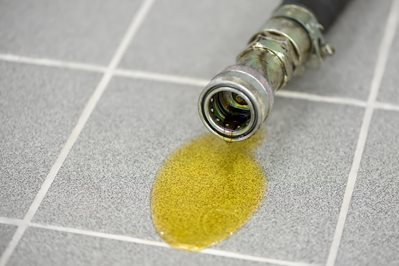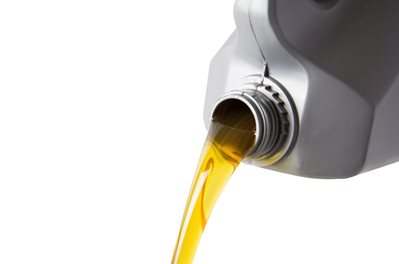Everything You Need to Know About Hydraulic Oil
You need to consider various factors to determine what type of hydraulic oil is best for your hydraulic system. A hydraulic machine manufacturer could recommend one type of oil. However, this does not mean it is always the best oil, depending on how you use the machine and in what operating conditions.

Using the wrong type of hydraulic fluid can lead to inefficiencies, system breakdowns, system failures, and increased maintenance costs. To get the longest life out of your hydraulic machinery and related parts and components, you need to select the most appropriate hydraulic fluid.
What Is Hydraulic Oil?
Hydraulic oil, or hydraulic fluid, is used in hydraulic systems and machinery to transmit power by pumping the non-compressible fluid through the system to generate pressure that is converted into force to complete desired tasks and work. Hydraulic oils can be oil-based mineral oils, synthetic-based, or water-based.
There are two primary factors you need to remember when selecting hydraulic oils:
- The Viscosity of the Oil
- The Type of Hydraulic Oil
What Are Some Uses for Hydraulic Oil?
Even though hydraulic fluid is primarily used in hydraulic systems and hydraulic machinery, there are other uses for it, including:
- As a lubricant to help keep moving parts and components operating correctly and reducing friction.
- As a coolant to absorb heat from various areas inside the system, and then release the heat in another area.
- As a sealant to help prevent leaks.
Why You Need to Understand the Flash Points of Hydraulic Oil
All hydraulic fluids have an ignition temperature you need to be aware of when selecting the fluid to use in a hydraulic system. Hydraulic fluids can become very hot as they pass through the system. While there is some heat transfer through exposed hydraulic hoses and pipes, it still does not reduce all the risks associated with extremely hot hydraulic fluid.
Oil-based fluids have a flash point temperature range from around 150 – 300 degrees Celsius. Depending on the type of fluid used, it can catch fire when it is 250 – 375 degrees Celsius.
However, the ignition temperature of hydraulic fluid can be lower, especially when it is under high pressure and accidentally sprayed from a burst hydraulic pipe, fitting, coupling, or other components onto hot surfaces. The mist of oil can easily ignite and start a fire.
By being aware of the fire risks and flash points of hydraulic oil, you can determine which type of fluid will best meet your needs and reduce fire risks.
Why Oil Viscosity and Operating Temperatures Matter
The viscosity of hydraulic fluids changes as temperatures increase or decrease. As temperatures increase, the oil becomes thinner. Conversely, as temperatures decrease, the oil becomes thicker. So, in cold environments, a lower viscosity fluid would be better because it is thinner and will not cause flow issues.
On the other hand, a higher viscosity fluid is better in warmer environments because it is thicker. As the system reaches a good viscosity operating temperature, the fluid will not become too thin.
How to Choose the Right Hydraulic Oil
Choosing the right hydraulic oil for your hydraulic system requires knowing what the recommended fluid type and viscosity are for the system. The manufacturer of the hydraulic pumps used in the system will recommend an oil viscosity.
A good starting point is using the recommended hydraulic fluid for your hydraulic pumps. Using this information, review the following factors to make adjustments to the type of hydraulic oil you need:
- The System Operating Pressure – What are the minimum and maximum pressures of your system?
- The Operating Environment – Is the system used indoors or outdoors? Are there dry and dusty conditions? Are there large variations in the ambient temperature ?
- Heat Transfer Rates – How much heat transfer is there between the hydraulic oil and system parts and components?
- Fire Risks – Would hot surfaces pose a fire risk if a hydraulic hose burst and fluid landed on them? Are there other fire risks you need to consider?
- Environmental Considerations – Is the system operating in an environment where a spill would be difficult to contain and potentially be detrimental to the natural world?
Taking all of these things into account, you can then determine the most appropriate type of hydraulic fluid for your hydraulic system.
Water-Based Hydraulic Oil
While it is one of the least used fluids, this is perfect for environments where the fire risks are extremely high. Water glycol is used to create a fire-resistant hydraulic fluid. However, you need to make sure the hydraulic pumps and other hydraulic parts and components are compatible with water-based hydraulic fluids due to their corrosive effects.
Synthetic Hydraulic Oil
Full synthetic hydraulic fluid is becoming more popular in newer hydraulic systems. The oil tends to last longer before it starts to degrade and needs to be replaced.
Another benefit of synthetic hydraulic fluid is it can handle temperature extremes from cold winter days to hot summer days. Additionally, it is well-suited to hydraulic systems that need to be operated at high pressures continuously.

Petroleum-Based Hydraulic Oil
Petroleum-based hydraulic fluid is the most common type of fluid used. It provides flexibility for a wide range of hydraulic systems that are operated in different conditions and environments.
Petroleum fluids are blended with various additives to help extend the life of parts, components, and seals by reducing wear and tear on them, preventing rust and oxidation with corrosion protection, and improving system performance.
As you can see, there are several considerations you must account for when choosing the most appropriate hydraulic oil for your hydraulic system and machinery. If you need help deciding which fluid is best or if you need
hydraulic pumps, motors, cylinders, and other parts, please feel free to contact White House Products, Ltd. at +44 (0) 1475 742500 today!
Back to blog posts